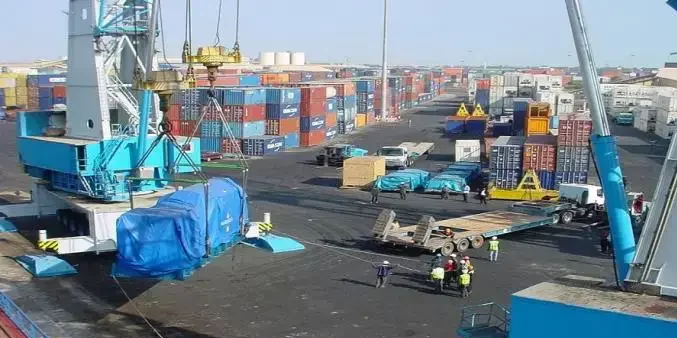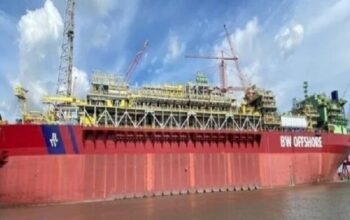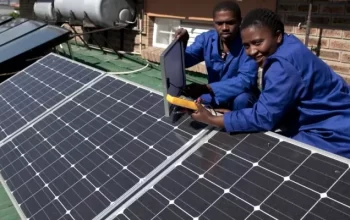Mauritania launches major infrastructure projects for the economic transformation of the country under the leadership of President Mohamed Ould Ghazouani.
The Government of Mauritania is investing heavily in the development of the Port of N’Diago with the aim of transforming the facility, 32 km away from the associated fishing village of Ndiago, into a maritime hub for the oil and gas sector.
Strategically located just 40 km and 100 km from the Greater Tortue Ahmeyim (GTA) development and the BirAllah fields, respectively, plans are progressing to position the port as a bustling maritime hub with world-class facilities, including a commercial quay, a military port, a fishing port, and a shipyard. Ndiago is well-positioned not just to service the region’s thriving oil and gas sector but also to cater to commercial activity.
In an interview with Energy Capital and Power (ECP), Isselmou Lehbib, Director of the Port of Ndiago, stated that the facility is “capable of facilitating cargo handling operations. With huge amounts of accessible land, the port hopes to attract industrial and logistical industries while also boosting the use of fisheries, agriculture, and oil resources.”
Ndiago, according to Lehbib, is not a competitor to other ports in the country such as Tanit, Nouadhibou, or Nouakchott. Rather, he stresses that all of the ports benefit each other and are part of a larger vision for the development of infrastructure in the country. “Historically, Nouadhibou has been associated with the mining sector, and Nouakchott is a large commercial port that is currently being considered for conversion into a hub. Because of its close proximity to the GTA and BirAllah fields, the Port of Ndiago has a considerable advantage in supplying the oil and gas business.”
In a separate interview with ECP, Moustapha Bechir, an oil and gas advisor at Mauritania’s Ministry of Petroleum, Energy, and Mines, suggested “launching a study to build a pipeline that would start from the site, the area where the GTA and BirAllah fields are located, and could serve Ndiago.”
The potential pipeline is not the only downstream endeavor being undertaken by the government. With connections in terms of infrastructure, power, and telecommunications representing critical aspects of development, Lehbib identified three important projects underway. The first comprises a road construction project connecting Ndiago to the capital city, Nouakchott.
“By reducing isolation, the road, which is expected to be completed in the first quarter of 2024, will help unlock Ndiago’s potential and boost commercial activity,” the Port Director emphasized. Secondly, a canal will be built to link the port to the Senegal River. This would not only allow landlocked neighboring Mali to create a river transit route along the Senegal River but would also offer access to mineral-rich areas along the river, helping Mauritanian towns. Furthermore, as mentioned by Lehbib, “it would encourage mining exploration because the Senegal River basin is believed to be rich in minerals such as phosphate.”
Thirdly, “A high-voltage power line will be installed to cater to the port’s needs and extensively electrify the entire district,” concluded Lehbib.
Finally, the Ministry of Petroleum, Energy, and Mines is now refining a study with bp to potentially develop a 500 MW gas-to-power plant in the Ndiago area that will serve both local requirements and the needs of the GTA Phase 2 and BirAllah developments. “In the near future, this power plant will be able to reach 1,000 MW. But, for now, we will start with 500 MW, which will be enough to meet our demands by 2027-2028,” Bechir explained.
“Due to its functionalities, the port can accommodate various activities,” Lehbib added. “But its main purpose remains to serve gas-related operations.” The Port of Ndiago will work with bp and Kosmos to supply and operate the GTA gas field. The port’s existing infrastructure, which includes deepwater access, electricity, and water availability, as well as proximity to key shipping routes, makes it ideal for supporting the initial gas exports from the field and the development of a gas terminal. Lehbib also hopes that the development of the BirAllah field will offer new opportunities for the port and region.
The Minister of Petroleum, Energy, and Mines of Mauritania will present an update on the first gas production expected this year, as well as progress being made to expand the Port of Ndiago at the MSGBC Oil, Gas & Power 2023 conference, which will be held in Nouakchott on November 21-22. For more information, click here.
![]()




